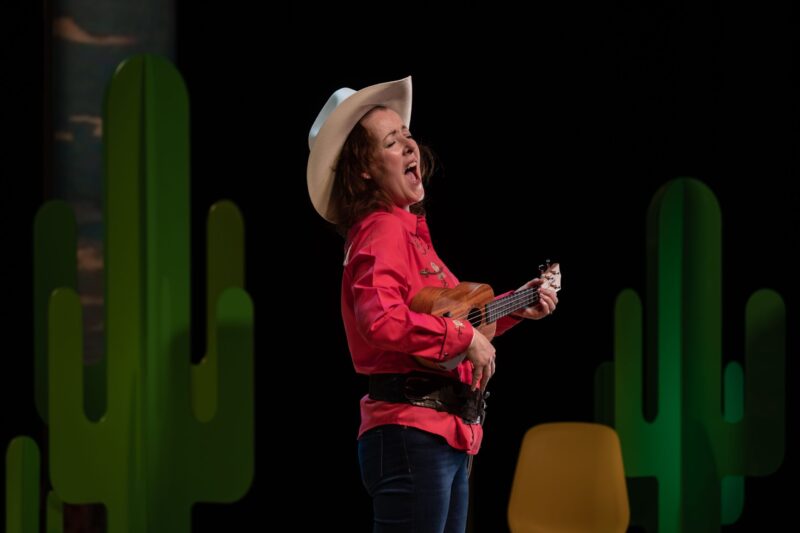
Upon entering the Draíocht for Deirdre Kinahan’s The Visit, the audience was greeted by the surprising setup of a stage full of Cacti, ukuleles and what appeared to be a recreation of the Wild West. With its initially unassuming title, lone performer Mary O’Driscoll soon lit up the production. Alone on stage, she delivered a tremendous performance filled with heart, courage and charm, touching emotions tenderly and delightfully entertaining the audience.
The show’s presentation of a middle-aged woman as the protagonist – unfortunately, is a rarity on both national and international stages – made The Visit a triumph in its very premise. Underrepresented in both gender and age, it was refreshing to see a woman in her own right, speaking of her own experiences of life and romance, and not through the lens of being a mother and wife. Indeed, O’Driscoll spoke honestly and with such raw truth, that the audience could not only sympathise with her character but also could feel the extent of the heartbreak and agony she suffered.
The only setback of the one-woman show format is that the other characters were rayed through O’Driscoll’s perspective, leaving doubt as to whether she is a reliable narrator. This particularly prevailed through her descriptions of her late husband, who is portrayed through the lens of her anger and shock as a result of his years of deceit and control. The audience is led to believe him to be a narcissistic and shallow man, dictating her and their son’s every move and decision, leading to their resentment. But perhaps if the play was from the perspective of the eponymous “visitor”, or her husband’s lover, we may have had an entirely different view.
The set design was certainly entertaining, both flamboyant and interactive elements complementing the piece. Wooden chairs became beds, cars and even a child at one point, with O’Driscoll tickling the legs as though it were her infant son. Although it could be viewed as a charade, O’Driscoll was so authentic, that the audience was able to vividly see what she was portraying on stage.
If the ukuleles seemed an abstract element upon entering the auditorium, O’Driscoll certainly enlightened the audience on their function, performing various renditions of country songs as well as a few ditties of her own. Moreover, she appeared outrageously comedic as she sang about her late husband’s clothing through a southern movie-style American accent. A criticism I may have is that the stories she tells, contrast so greatly from each other emotionally, and seem to ricochet so quickly from one to the next, that you can never truly process what has unfolded and what information has been revealed to you. You must switch your brain into the next anecdote, feeling bereft for her loss, while laughing at her stetson.
Constantly left on their toes, you truly did not know what to expect next, which made this piece all the more heart wrenching, as you were taken on a journey from misery to joy and revelation. The Visit was so delightfully simple, but audiences left the theatre feeling as though they could conquer the world, and take on a new lease, just as O’Driscoll so bravely demands by the end of the piece.






